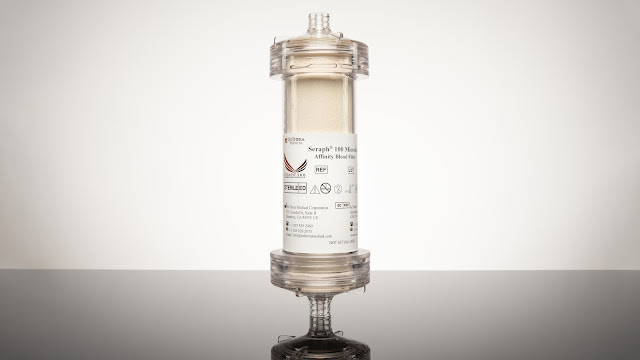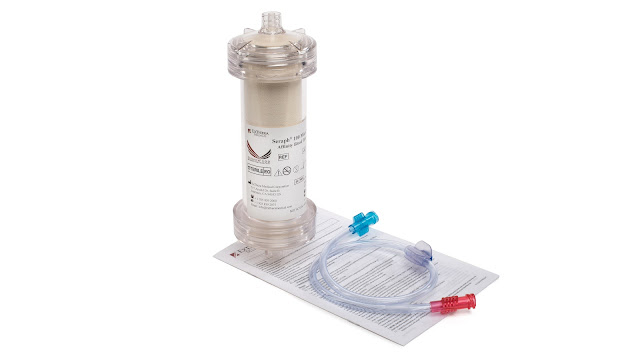Blood filtration system used in care against COVID-19 may provide novel treatment for Sepsis
The Seraph® 100 blood filtration system, initially used against COVID-19, is being investigated as a potential novel treatment for sepsis by researchers at the Uniformed Services University (USU), in collaboration with several medical institutions. If proven effective in the ongoing study, this technology may represent a significant advancement in sepsis therapy.
September 14, 2023 by Hadiyah Brendel
Sepsis, according to the Centers for Disease Control and Prevention, affects at least 1.7 million American adults each year. Of those individuals, 270,000 will die from sepsis. Researchers at the Uniformed Services University (USU) aim to discover if the Seraph® 100 blood filtration system can be an effective treatment against sepsis through the PURIFY RCT study.
Sepsis results as a complication of an infection in the bloodstream. The body releases chemicals to ward off infection, which triggers inflammation throughout the body. If the cause of the infection isn’t stopped with medical intervention, such as antibiotics, the body’s response to the infection elevates. Extreme response can develop into severe sepsis, or organ failure. Further escalation can lead to septic shock, which includes low blood pressure in addition to organ failure, and even death.
Bacterial infections are the most common cause of sepsis. Viral infections, such as COVID-19 or influenza, fungal infections, and even traumatic injury may also lead to sepsis.
Air Force Col. (Dr.) Ian Stewart, director of the Division of Nephrology in the School of Medicine at USU, leads the PURIFY RCT Study. Five sites serve as locations for the study: Good Samaritan Hospital, in Corvallis, Oregon, Methodist Hospital, in San Antonio, Texas, the University of Michigan, Ann Arbor, Mich., the University of Texas Health Science Center, San Antonio, and the University of Texas Southwestern Medical Center, Dallas. Drs. Brian Delmonico, Jeffery DellaVolpe, Lenar Yessaya, Diego Maselli, and Caroline Park conduct the studies at those sites, respectively.
A different version of the study, PURIFY OBS, began in 2021 by former chair of USU’s Department of Medicine, Army Col. (Dr.) Kevin Chung. That study, funded by a grant from the Defense Advanced Research Projects Agency, observed blood samples of COVID patients receiving treatment with the Seraph® 100. Once Chung left USU, Stewart took over as lead investigator.
Stewart says the Seraph®100 works just like a filter. Within the filter are tiny polymer beads and attached to those beads is a substance called heparin. Heparin is the major component of the lining of the endothelium, or the lining of the blood vessels. That lining, called the glycocalyx, is composed mostly of heparin. Pathogens, such as a variety of bacteria, fungi, and viruses, evolve to bind to glycocalyx so they can then get into the body’s tissue.
With the Seraph®100, pathogens that would normally bind to the glycocalyx instead bind within the filter. The study aims to show that as blood flows through the Seraph®100, the filter removes the pathogens that are causing the infection.
If the filter, in fact, removes pathogens, then it will work in a different way from how antibiotics treat sepsis. While antibiotics kill the bacteria, all the components of that pathogen release into the bloodstream. Those components, called PAMPs or pathogen-associated molecular patterns, can still cause a reaction with the body.
If the body reacts too strongly, that may be where a lot of complications from sepsis, particularly the low blood pressure, arises. Stewart theorizes the sickest patients develop not in reaction to the pathogen itself, but to a robust response to that pathogen. That pathogen-associated response may be leading toward critical illness.
Stewarts says with the PURIFY RCT study, the hope is that by removing those bacteria and the pieces of the bacteria, the PAMPs, outcomes in critically ill patients suffering from sepsis will improve.
Even patients who survive sepsis face significant morbidity, requiring rehabilitation and prolonged care. Additionally, Stewart says “epidemiologic evidence indicates survivors of sepsis are at a higher risk for subsequent cardiovascular disease and long-term mortality.”
The study is currently in Phase II of its clinical trial. At completion, it will enroll 60 patients with severe sepsis who are currently taking vasopressors. Vasopressors work to improve blood pressure, improving the flow of blood to the organs. Forty patients will receive standard care in addition to treatment with the Seraph®100. The remaining 20 patients will serve as the control, and will receive standard care alone without the blood filter treatment.
Currently, the study has enrolled 14 patients. 10 are in the treated group, and four are controls. The study is in a pause-phase to ensure the Seraph®100 filter is not removing antibiotics from the patients. Once it’s established that the filter does not remove antibiotics from a patient’s bloodstream, enrollment of patients will resume.
If the study proves efficacy, it will provide a significant shift in the treatment of sepsis.
“Sepsis is a major cause of morbidity and mortality,” Stewart says. “There has not been a paradigm changing discovery for the treatment of sepsis since the discovery of antibiotics almost 100 years ago.
“This hasn’t been for a lack of trying; a multitude of different therapeutics have been tested and found not to be beneficial. While we definitely still need to prove that the device works, my sincere hope is that this therapy could be the first big breakthrough in the treatment of sepsis in almost a century,” Stewart adds.
Although approved for the removal of pathogens in Europe, the only approved indication in the United States for the Seraph®100 is COVID-19. That approval is under Emergency Use Authorization. The aim is once the study proves efficacy, the blood filtration device will receive approval for other indications as well.
And while Stewart isn’t looking forward to the next pandemic, he says the idea of the device is that it can remove a virus while medical treatments are being developed. “So while we wait to get things like vaccines or antivirals or other medications, [the filter can] buy us time for the most critically ill patients. That's the overarching concept,” says Stewart.
Stewart says another implication where it might prove important is for antibiotic-resistant bacteria. Those specific pathogens, he says, “would be another emerging kind of pathogen threat where [the Seraph®100] might be helpful. There are literally no medications you can use that can effectively treat this infection – then this device becomes very, very attractive as a potential option.”


![“So while we wait to get things like vaccines or paxlovid, remdesivir or other medications, [the filter can] buy us time for the most critically ill patients. That's the overarching concept,” says Stewart. (Photo courtesy of ExThera Medical).](https://blogger.googleusercontent.com/img/b/R29vZ2xl/AVvXsEi4J-dIQWRnqs8zzIpIALq6Be34ID_xhHyQuh02YEpnlcEP7xQbOlLLt0MI5giQumeLJ2ZK9BjmTYascQGRf2vUMGTvP9Dkb7nlJdtR50Fe3jTsF175HUKMlLGRw3sKSpA_Pp4rhUd1il6TjqOBDZbpxrjd2brvUjBcnzPlTAXuHSLjSuo6Tlv4dyn03HY/w640-h360/Seraph%20100_4.JPG)

